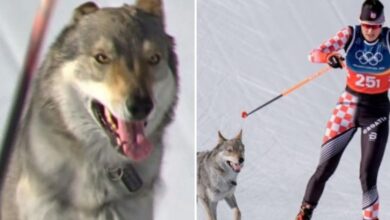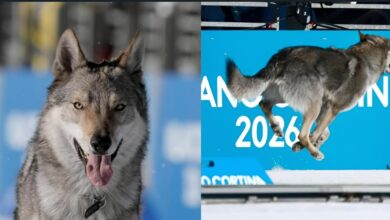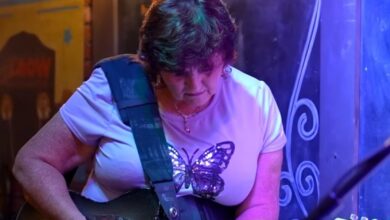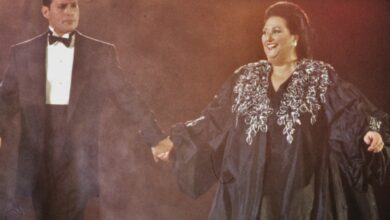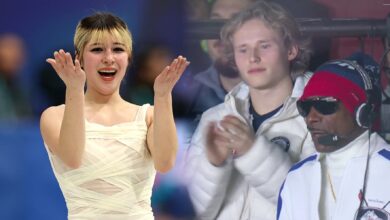Steven Tyler and YUNGBLUD Team Up with Steve Martin for a Stunning New Version of “My Only Angel”
The story of this version begins with a date: October 24, 2025. That’s when Aerosmith’s Steven Tyler and YUNGBLUD dropped a reimagined “Desert Road Version” of their single “My Only Angel,” recruiting comedy legend—and legitimately elite picker—Steve Martin to lace the track with banjo. On paper it sounds like a Mad Libs fever dream; on record it’s a dusty, widescreen reroute that trades neon glow for campfire embers, highlighting melody, space, and storytelling. The cut is less “radio in the Camaro” and more “AM static across the Mojave,” and it works far better than anyone had a right to expect.
Part of what makes this moment special is how quickly the collaboration matured. Just a month earlier, the original “My Only Angel” arrived as the lead single to a full Aerosmith × YUNGBLUD joint EP titled One More Time, due November 21. That first version reintroduced Aerosmith not as a legacy act dusting off the past but as a living organism hungry for a new sparring partner. The “Desert Road” revamp leans into that same chemistry but reframes it: less adrenaline, more atmosphere; fewer fireworks, more moonlight. It’s the same song, different camera lens—and the new angle reveals textures you might’ve missed the first time.
If you trace the DNA of this team-up, the trail runs straight through the 2025 MTV VMAs. There, Tyler and Joe Perry walked onstage with YUNGBLUD and Nuno Bettencourt to salute the late Ozzy Osbourne, swinging from “Crazy Train” to “Changes” to “Mama, I’m Coming Home.” It was one of those unplanned-feeling planned moments: the kind that collapses decades, scenes, and aesthetics into a single, roaring yes. Backstage photos telegraphed the vibe—grins, sweat, and that just-stomped-a-monitor buzz—and a coy “we’ve got a secret” tease soon followed. The “secret,” of course, was a studio rendezvous that turned into “My Only Angel,” then an EP, and now this alt-country-tinted redraw.
The “Desert Road Version” itself lands like an open-skied postcard. Martin’s banjo doesn’t merely ornament; it converses, answering vocal phrases with clipped, bell-bright runs and droning rolls that feel both old-timey and cinematic. Instead of crowding the mix, his parts create negative space—pushing the vocal blend of Tyler and YUNGBLUD into sharper relief. Suddenly, the lyric’s push-pull ache isn’t just shouted at the horizon; it’s whispered across a dashboard at 2 a.m. That tonal pivot unlocks a different emotional register, translating arena urgency into intimate resolve.
And about that vocal blend: the intergenerational alchemy is the hook you can’t shake. Tyler’s voice—ragged velvet with a siren’s edge—meets YUNGBLUD’s hyper-present intensity, and the two carve a single silhouette. In the original mix, their harmonies rode a muscular, modern hard-rock chassis. Here, the absence of bombast lets you hear how their grains interlock: the scrape in Tyler’s upper register wrapping around YUNGBLUD’s forward consonants, every inhale part of the rhythm section. It’s proof that “loud” isn’t a volume setting; it’s conviction, and conviction survives any arrangement.
Fans didn’t exactly need convincing. The first release bolted straight to No. 1 on Billboard’s Hot Hard Rock Songs, the kind of chart quirk that functions like a weather report for the rock ecosystem: pressure dropping, storm arriving. A month later, rolling out an alternate take with a left-field guest feels less like hedging a bet and more like doubling down on momentum. If anything, the chart pop validated a thesis: put great melodies in a fearless frame and both old heads and new kids will lean in.
What makes the Steve Martin cameo so delicious isn’t just novelty; it’s fit. Martin isn’t crashing a rock party—he’s a Grammy-winning bluegrass lifer whose tone is crisp as a winter apple. He approaches the song like an arranger, not a tourist, finding pockets between piano murmurs and guitar ghosts. The banjo’s percussive snap stands in for shakers or hi-hat chatter, subtly moving the song along without demanding attention, until a quick flurry reminds you he can absolutely rip when the road straightens.
Context matters, too. Aerosmith entering a new-music era more than a decade after their last studio album was already a headline; doing it with YUNGBLUD reframed the narrative from “comeback” to “cross-pollination.” The EP promises fresh co-writes from Tyler, Perry, YUNGBLUD, and Matt Schwartz, plus a new spin on “Back in the Saddle”—not as nostalgia bait, but as a statement that the catalogue is clay, not marble. The “Desert Road” cut continues that thesis: these artists are treating songs like living documents, open to revision when a different wind kicks up.
Sonically, the remix nudges the tune closer to the Western gothic. Where the original track rode a big-room backbeat and Perry’s fret-burning heroics, this version dials the guitars to sepia and lets the banjo sparkle where cymbals might’ve once sizzled. You can practically feel the dust swirl around the kick drum’s low thud. It’s not country, not exactly Americana, but it borrows the discipline of both: play fewer notes, mean more by them. You don’t miss the fireworks because you can see the stars.
Lyrically, “My Only Angel” has always carried a goodbye-that’s-really-a-benediction, addressing someone you love enough to leave. The “Desert Road” palette recasts those lines like roadside liturgy. What sounded like a curtain call in the original now feels like a hand squeeze before the long drive: compassionate, resigned, strangely hopeful. When Tyler and YUNGBLUD hit those shared phrases, the double-exposure effect is stunning—the past and the future singing in unison, neither canceling the other.
And then there’s the meta-story: Steve Martin posting, deadpan ecstatic, “I’m playing banjo on a Steven Tyler song!” along with a text-thread wink. It’s the kind of post that melts the internet because it collapses worlds—your favorite goofball from Only Murders is also your favorite banjo uncle—and it tells you the sessions weren’t just productive; they were fun. Joy, it turns out, is audible on tape. You can hear it in the way the players leave room for each other, confident the song will carry them all.
Zooming back, the collaboration also feels like a small alignment in a larger constellation. Rock is healthiest when it’s porous: elders lending heft and history; upstarts lending spark and risk. The VMAs tribute was the handshake; “My Only Angel” was the first dance; the “Desert Road” version is the late-night drive afterward, windows down, laughter fading into harmony. It suggests the EP won’t be a one-speed machine but a suite—room for thunder and for tumbleweeds.
From a career-arc perspective, the timing is shrewd. Aerosmith’s audience is multi-generational; YUNGBLUD’s is borderless and hyper-online. A surprise alternate version with an instantly recognizable cultural figure expands the circle without alienating the core. It’s strategic, yes, but it’s also generous: an invitation to listeners who don’t care about genre checkboxes so long as the song tells the truth. You can call that marketing; I call it curation with taste.
Production-wise, the “Desert Road” mix is a masterclass in restraint. Acoustic guitars bloom and vanish. The banjo sits just off-center, letting the piano smudge the opposite edge. Reverbs feel like heat haze rather than cathedral walls. Most importantly, the arrangement respects silence—those tiny, breath-wide gaps that make the next note feel necessary. In a playlist era where everything chases immediacy, this version wins by letting tension breathe and payoff arrive a half-second later than your ear expects.
Live, you can already imagine the possibilities. Open a set with the shimmering original to light the fuse, then step to the stools, dim the rig, and unspool the “Desert Road” as a mid-show narrative pivot. Or flip it: begin with the slow-burn and later detonate the full-throttle take. Either way, the existence of two honest faces for one song gives the artists a dramaturgical tool on stage—and fans two memories to collect.
Perhaps the most charming takeaway is how unforced the whole thing feels. Steve Martin on banjo could’ve been a novelty sticker slapped on a press release. Instead, it’s musical glue. YUNGBLUD stepping into Aerosmith’s world could’ve been cosplay. Instead, it’s conversation—two accents speaking the same language. Tyler returning with new material could’ve been a valedictory lap. Instead, it’s a door opening. That’s why this version resonates: it isn’t just different; it’s necessary.
And if you’re keeping a scrapbook, the receipts are already piling up: the original single’s chart sprint; the EP’s locked date; the banjo cameo heard ’round the timeline; the VMAs spark that lit the fuse. Put them together and you don’t just get a clever remix—you get a living exhibit on how rock evolves when its architects stay curious. As the “Desert Road Version” fades, you’re left with an odd sensation for a song about leaving: the feeling that the real trip is only beginning.
If you want to hear where this story started and where it’s headed, the official audio for the first release is out now, and the EP One More Time is around the bend. But today belongs to a dusty reroute, a five-string shimmer, and two voices proving that reinvention doesn’t mean replacing your heart—only reframing the view so it catches more light.
